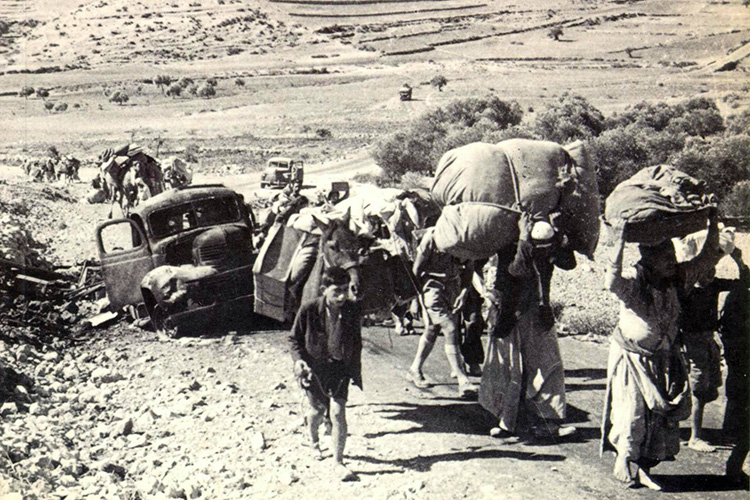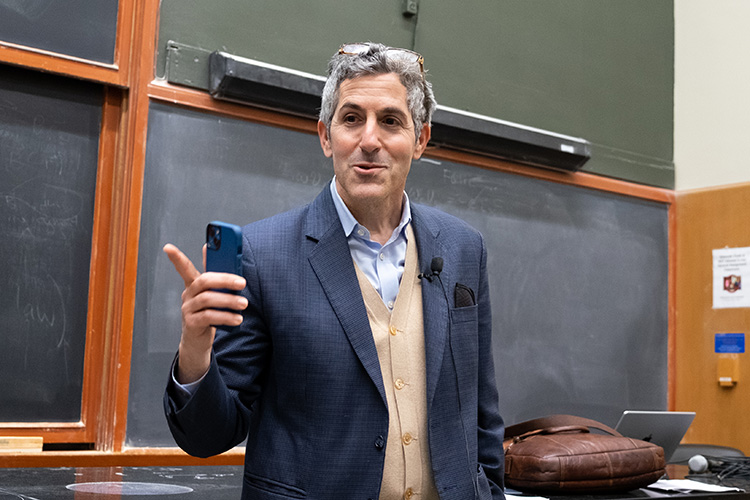Berkeley course examines Palestinian history, ‘putting the people first’
History professor Ussama Makdisi’s class gives students access to text, research that encourages ‘intellectual courage’ and promotes a sense of belonging in the classroom
April 25, 2023

UC Berkeley Professor Ussama Makdisi’s Palestinian history course focuses on the history of Palestine, as told by Palestinians. In this archival photo, Palestinian refugees travel by foot after being displaced in the late 1940s. (Photo courtesy of Wikimedia)
The jersey hijab Ro’aa Alkhawaja wore in high school drew ire and ill-informed questions from her classmates who sometimes assumed she was a refugee displaced from war, and the headscarf was an oppressive tool she was obligated to wear out of fear. That it somehow limited her physical and intellectual capabilities — her freedom.
But for Ro’aa, the hijab is an empowering symbol that signifies the love she has for her Muslim faith and the modesty and humility of character “I strive for inwardly.”

Ro’aa Alkhawaja at her 2022 high school graduation ceremony in San Diego. (Photo courtesy of Ro’aa Alkhawaja)
“But people saw me as a stereotype and never really put the effort into truly understanding me,” said Alkhawaja, whose parents are Palestinian. “I had to compromise my identity and constantly explain who I was. I felt like a spectacle. … It was very dehumanizing, and I didn’t feel like I ever belonged.”
But at UC Berkeley, Alkhawaja, a first-year astrophysics major, has found an inclusive academic community in a class where she said her identity isn’t just viewed in the context of violent generalizations, but as part of a rich and vibrant history that should be understood and explored.
Taught by Berkeley history professor Ussama Makdisi, the course, History 100 M Special Topics: Palestine and the Palestinians: A Modern History, is using a unique lens to teach students about contemporary Palestinian history in the South Asian, Southwest Asian and North African regions — through the voices and experiences of Palestinian people.
The course, which will be offered as History 110D moving forward, challenges students to answer transformational questions like: What does Palestinian liberation mean? What would peace in the Middle East look like? And how does modern history offer insights for people in the region, moving forward?

Makdisi said he encourages “intellectual courage” and a free flow of ideas and opinions in his classroom. (UC Berkeley photo by Sofia Liashcheva)
“There’s a history that predates what we call the Arab-Israeli conflict,” said Makdisi, who initially came to Berkeley as a visiting scholar in 2019 and began his first full year as a faculty member last fall. “The reality is there’s some extraordinary histories of coexistence in the Middle East and Arab world.”

Dania Matos is the vice chancellor of equity and inclusion. (Photo by Brittany Hosea-Small)
For Dania Matos, Berkeley’s vice chancellor for equity and inclusion, Makdisi’s course not only unveils an often unacknowledged history, but is especially significant given that Berkeley is currently celebrating Arab American Heritage Month.
“For the first time in years, we are offering this class, and because our students are reflected in learning spaces like Professor Makdisi’s, they feel a greater sense of belonging,” said Matos. “This is what’s possible when we imagine, create and actualize the conditions that support thriving for every member of our campus community.”
A spirit of understanding
Offered through Berkeley’s Department of History, the upper division course includes readings, guest lectures and films by Palestinian poets, historians, filmmakers, lawyers and grassroots organizers.
And while Makdisi said he attempts to present the facts about modern Palestinian history to allow students to come to their own conclusions, the course does address the role that ideologies such as Zionism and Palestinian liberation play in the history they examine.
But in a classroom that has attracted students from various backgrounds, religions and ethnicities, those topics, Makdisi acknowledged, can be quite personal. That has led to lively conversations, questions and disagreements that can sometimes get uncomfortable.

Student Paulina Villasenor, right, engages in a conversation with Makdisi and her classmates on April 6. (UC Berkeley photo by Sofia Liashcheva)
“But disagreements are not dangerous,” second-year student Paulina Villasenor said.
Villasenor, who is Mexican American, said she was raised Catholic. While the course has included contentious conversations among students, she said, “our class has built a productive learning environment where we all treat each other respectfully. We are encouraged to disagree in the spirit of understanding and to speak our thoughts freely.”
And that ideological inclusivity is reflected in the way Makdisi acknowledges students from all faiths, ethnicities and backgrounds in his course.

Sam Bernstein will graduate with a degree in history this spring. (Photo courtesy of Sam Bernstein)
Sam Bernstein, a graduating history major said the course has exposed him to a history that was previously inaccessible. Bernstein, who grew up very connected to his Jewish religion and traditions, took Makdisi’s course to get a better historical understanding of Palestine and how people coexisted over time.
Nuggets of history that have surprised Bernstein include the fact that, for a time prior to the establishment of the state of Israel, Arabs, Muslims, Jews and people of all faiths lived peacefully in the region of Palestine.
“That was really enlightening for me,” said Bernstein. “I think mainstream narratives want us to think that there is an inherent conflict between Jews, Arabs and Muslims. But Professor Makdisi has created an atmosphere of learning where we can approach the history with more nuance.
“It’s a massive historical mission, and I feel privileged to have access to this information.”
A sense of living history
Author of the book Age of Coexistence: The Ecumenical Frame and the Making of the Modern Arab World, Makdisi has conducted research on the history of the modern Middle East for over 20 years, debunking religious myths and Islamophobic stereotypes that Makdisi said have persisted in the West’s historical narrative.
But ancillary to his academic research, Makdisi’s expertise is informed by his childhood in Lebanon during the country’s civil war in the 1970s and ‘80s. Makdisi said he witnessed the human toll that the politics of violence and war can have on people in the region.

Those years were very formative, he said, as they helped him understand how historical narratives are often constructed to favor the victors in “very simplistic terms.”
Makdisi said he realized very early on in his academic career that since establishment of the state of Israel in 1948, in which large populations of Palestinians were displaced, Arabs have been orientalized and stereotyped as terrorists, and as extremists by the West.
Arab history, he said, was ignored, and the people were demonized, “making it easier to dehumanize them.”
“But living through war, you really do appreciate the sense of living history in a way that it’s not just a detached, remote idea about people in the past,” he said. “It’s about linking past and present together and seeing how people in the present have an opportunity to open their eyes, to see the humanity of people around them.”
A place to belong
Berkeley transfer student Lydia Hirsch said she has taken courses at other colleges that taught Palestinian and/or Middle East history, but they never helped her understand the plight of Palestinians in the West Bank.
While Makdisi has focused less on the conflicts and more on the people, Hirsch said the course readings have made her realize now more than ever that “history shapes the world we live in today.”
“And you can’t really understand political problems that exist today without having an understanding of history, or it will just seem like a really myopic view of the actual problems,” Hirsch said.

Soumbasakis said the history course has expanded their knowledge around contemporary Palestinian issues. (Photo courtesy of Mia Soumbasakis)
Guest lecturers have also played a significant role in the course, said ethnic studies major Mia Soumbasakis.
Getting firsthand accounts from people living in the Arab world about the displacement and living conditions Palestinians currently experience, Soumbasakis said, has given students a better understanding of how modern history is currently impacting families in the region now.
Makdisi recently invited Nadera Shalhoub-Kevorkian, a human rights attorney and Hebrew University of Jerusalem law professor, to the class to share her experiences as a social worker for children in the West Bank.
Shalhoub-Kevorkian described how young students walking to school are searched and suspected of being terrorists on a daily basis. “She definitely expanded my knowledge of what it means to grow up as a Palestinian child living in the West Bank,” Soumbasakis said.
Makdisi intends to teach the course again and said he hopes he has inspired his students to stay “intellectually courageous” and open-minded in their academic pursuits.
“I just hope they are able to feel some joy in learning about this history,” he said, “despite the tragedy that exists in much of it.”
For Alkhawaja, just observing the way her classmates who aren’t Palestinian express their empathy and compassion for her own culture and history “sometimes makes me emotional.”
“I think it’s beautiful,” she said. “The class has really given me a space to thrive intellectually and be my true self. I feel like I have a community that truly understands me. I feel seen.”

Alkhawaja with her brother and mother inside the Dome of the Rock mosque during a trip to Old City Jerusalem. “The class has really given me a space to thrive intellectually and be my true self. I feel like I have a community that truly understands me. I feel seen,” she said. (Photo courtesy of Ro’aa Alkhawaja)